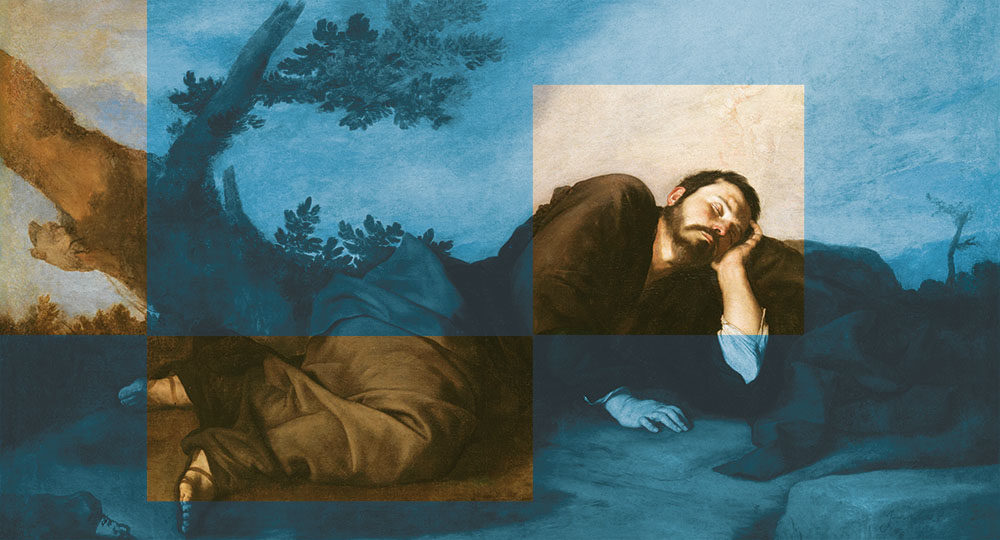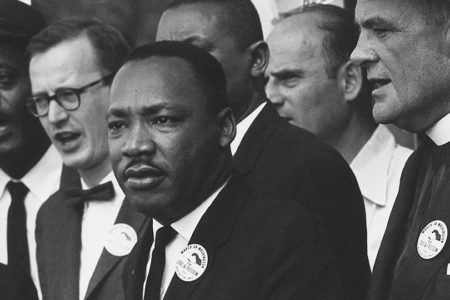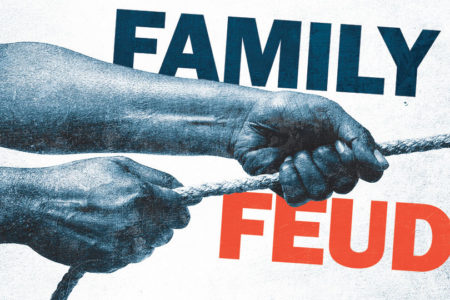The Man Whom God Knighted
Critics often emphasize Jacob’s moral failures. But despite his human frailties, he grew into a man of character, deep affection, and devotion to God.
This article ran in the June 1944 issue of Israel My Glory, as the Allied forces landed on the beaches of Normandy, France, during World War II.
There is no other biblical personality that has been made more the butt of harsh and unfair criticism than that of the patriarch Jacob, one of the ancestors of the Jewish race. He is depicted as the cunning supplanter and schemer who takes advantage of his guileless and trusting brother, Esau, and robs him twice of his birthright and parental blessing.
Jacob is also accused of having acquired sheep and cattle by dubious means in his dealing with Laban, his father-in-law. Having painted him as a black character, his accusers thereupon proceed to point out that the Jews should have all the deplorable characteristics and moral ineptitudes of their ancestor. For centuries Jacob has been a strong weapon in the hands of the anti-Semites against the Jews.
It is true that Jacob, perhaps more than anybody else, personified his descendants the Jewish people. Yet after a close scrutiny of his biblical record, we reach the conclusion that the Jewish people have cause to look back with a sense of pride rather than shame upon their patriarchal prototype.
It is to the eternal glory of the Bible and a strong proof of its reliability and trustworthiness that the characters described in that Book are true to life. No attempt is made to gloss over their failures or sins or to make them appear as saints without blame and blemish. The ancient pagan classics always made of their heroes supermen and half-gods.
Jacob’s character, full of human frailties and failings, is real and near to us. The Word of God does not portray him as a plaster saint, but as a very human kind of being, sinful and wayward. The story of Jacob is the story of the power of God working upon the human heart, which seeks to break the shackles of self and sin and longs to dwell in the nearness of God. The greatness of Jacob is in his pathetic struggle against the earthly bonds and his striving to attain the things of God. In Jacob we see a sinner with the makings of a saint and of a great man of God.
Two Brothers—Two Worlds
Compared with his twin brother, Esau, the character of Jacob stands out in bold relief. The two are as different as are the flesh and the spirit, as differs the mind of this world from the mind of God. Born from one womb, the brothers belong to two different and essentially hostile worlds. Their incompatibility is indicated in the Word of God even before their birth:
And the children struggled together within her [Rebekah];…And she went to enquire of the LORD. And the LORD said unto her, Two nations are in thy womb, and two manner of people shall be separated from thy bowels (Gen. 25:22–23, KJV).
And they were separated forever. A further indication as to the difference of the two brothers we have in the following words of the Scriptures: “And the boys grew: and Esau was a cunning hunter, a man of the field; and Jacob was a plain man, dwelling in tents” (v. 27, KJV).
Esau represents the natural man with earthly needs and cravings. His chief interest is in hunting and in the satisfying of his physical appetites. But concerning Jacob we read that he was “a plain man.” The Hebrew idiom for “plain” (tam) conveys more than the English plain. It points to a steady, persevering character, one who is likely to press forward through suffering or prosperity, exile or return, bereavement or consolation.
Esau the hunter, the child of nature, is impulsive and prompted by his natural instincts. Jacob the tentmaker is contemplative, spiritually minded, and hungry after the things of God.
When Esau is hungry, food is above everything. The bowl of red pottage is more highly regarded than his birthright. Jacob, however, desires this one thing above all else, to obtain the birthright and the divine promises and blessings incidental to it, the chief one amongst them being the promise of a Redeemer (12:3). To Esau, these things are of little value and meaning: “Then Jacob gave Esau bread and pottage of lentiles; and he did eat and drink, and rose up, and went his way: thus Esau despised his birthright” (25:34, KJV).
This is the divine verdict concerning Esau, that he despised the gift of God and held it as of little value. Perhaps therein lies the explanation of the seemingly arbitrary and harsh words of God: “Jacob have I loved, but Esau have I hated” (Rom. 9:13, KJV). Their Creator knew better than anybody else what was in each one of them.
Jacob may at times seem crafty and subtle and in comparison with the natural and simple-minded Esau even appear unfavorably. Yet with all this Esau was an earthbound being, where the Spirit of God finds no entrance. Only Jacob could dream of angels and God, for his deepest waking yearnings were spiritual.
Jacob is affectionate, his love for Rachel tender and constant. He is a devoted son. In his love for his children, especially for Joseph and Benjamin, there is pathos and passion, causing him, as he expressed himself, to go down “with sorrow to the grave” (Gen. 42:38). Such a character is not to be scoffed at. Its tragic complexity commands our sincere respect. Like in all profound characters, there seem to be in him irreconcilable contradictions. His twofold name, Jacob-Israel, is in itself indicative of that. Through toil and suffering, Jacob, the supplanter, is gradually transformed into “Israel—the prince with God.” With the passing of the years, the cruder features of youth become softened and purified, and his character crowned with the grace of humility expressed in that lovely passage of Jacob’s confession before God: “I am not worthy of the least of all the mercies, and of all the truth, which thou hast shewed unto thy servant” (32:10, KJV).
When considering the relationship between Jacob and Laban, we must bear in mind the fact that it was Laban in the first place who took advantage of and exploited his son-in-law. Jacob only matched the unscrupulous cunning of Laban with a little guile of his own. Hard as the bargain was, Jacob adhered strictly to the terms of the contract. It was Laban who proved himself to be the crafty and unscrupulous employer, causing Jacob to complain bitterly: “Thus have I been twenty years in thy house; I served thee fourteen years for thy two daughters, and six years for thy cattle: and thou hast changed my wages ten times” (31:41, KJV).
Jacob’s experience with Laban seems to be prophetic of the experiences of his children the Jews. They too often were given an unfair and raw deal. They were often forced into a position in which their only weapons against injustice and brute force were shrewdness and an ability to outwit those who would rob them, if they were to survive at all in a hostile world. Yet when treated with equity and fairness, they are as honorable and straightforward as any people in the world.
In the seemingly mercenary and self-seeking Jacob there is the dormant Israel, which means “a prince with God.” The world does not see it or realize it, yet Christ did. Zacchaeus, in the eyes of his contemporaries, was just a little, mean, sordid publican; but Christ, who could look into the soul of the man, discerned in him a hunger after righteousness, in whom there was the making of a great disciple (Lk. 19:9–10).
The magic of love in conjunction with the magic of faith performed a miracle of grace. These miracles still happen today, and the tribe of the Zacchaeuses is more numerous than ever.
The Wrestling Jacob
The early part of Jacob’s life was that of a hardheaded, successful businessman. Yet it was hardly a peaceful and happy life. From without, there was conflict and persecution. From within, a constant striving and struggling. Through the years of exile, he gained wealth and increased in numbers, but the returning Jacob meets on the threshold of his homeland his unreconciled brother, Esau, still mindful of the wrong endured. It was fear, grim and paralyzing fear for himself and his loved ones, that caused him to seek divine help in solitude and in prayer.
But at the fords of the swift brook of Jabbok, he suddenly discovered that his contention was not against flesh and blood but against a far more formidable antagonist. He wrestled with a man who later revealed Himself as God. The God who promised him for his inheritance the land to which he was now returning did not wish him to come as the old Jacob, clever and worldly successful, but contrite, conscious of his sins and regenerated: “And he said, Thy name shall be called no more Jacob, but Israel: for as a prince hast thou power with God and with men, and hast prevailed” (Gen. 32:28, KJV).
The God-Man who wrestled with Jacob was the same God-man, the Lord Jesus Christ, who wrestles forever with each one of us, seeking to smite in us that which is sinful and selfish so that from dust and darkness may rise at dawn a new man with a new name, not Jacob but Israel—a prince with God and man.
Jacob’s defeat is also his victory. Smitten by God, he rose up more than a conqueror. At dusk there was a fearful, apprehensive man by the name of Jacob, a man haunted by his past—at dawn after a memorable vigil, there arose a new man, knighted by God and given a new name—Israel. Truly we have no reason to be ashamed of the fact that the God of Abraham and Isaac is also the God of Jacob.
The Prophet Jacob
The life of Jacob is so rich in spiritual qualities and so full of wonderful experiences that it is impossible even to outline its contours in a brief article. Yet we must not leave unmentioned this grand feature in his character, namely, “The Blessed Hope” that was in him. Our Lord said, “Your father Abraham rejoiced to see my day: and he saw it, and was glad” (Jn. 8:56, KJV).
These words of our Savior apply with equal force to Jacob. On his deathbed Jacob blessed Judah, of whom he knew that the Messiah would come, and said, “The sceptre shall not depart from Judah, nor a lawgiver from between his feet, until Shiloh come; and unto him shall the gathering of the people be” (Gen. 49:10, KJV).
And with his dying breath, the weary and worn servant of God whispered, “I have waited for thy salvation, O LORD” (v. 18, KJV). This was the hope which Jacob left as an heritage to his children, and even to the present day it is still in the family. This was the hope that gave wings to the words of David the king and to the prophets. This was the hope which filled the breast of the aged Simeon with heavenly joy when he held the Child Jesus in his arms and said, “Lord, now lettest thou thy servant depart in peace, according to thy word: For mine eyes have seen thy salvation” (Lk. 2:29–30, KJV).
Even though “blindness in part” has happened to the Jews today (Rom. 11:25), this is still their hope, for are they not the children of Israel?








